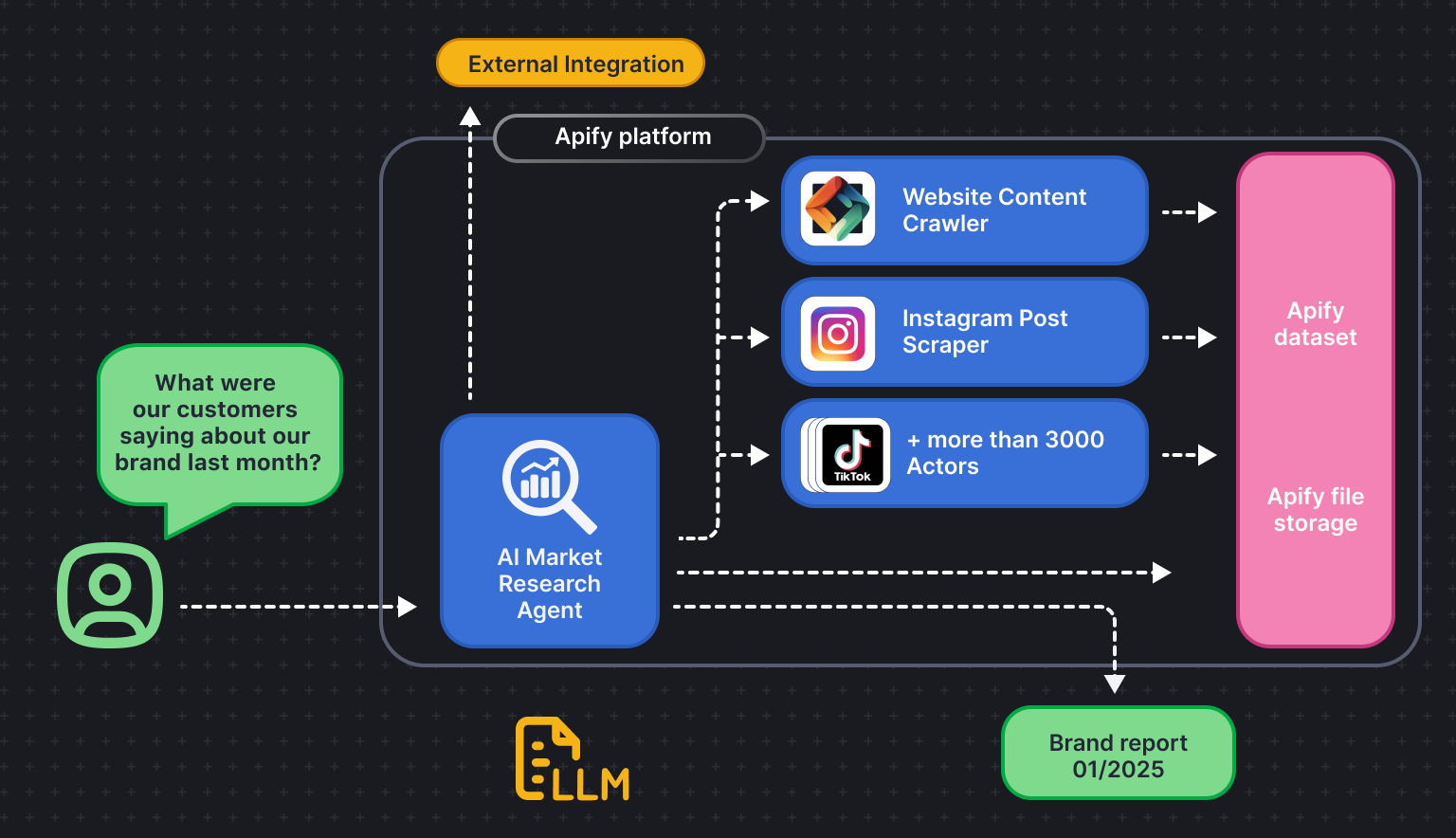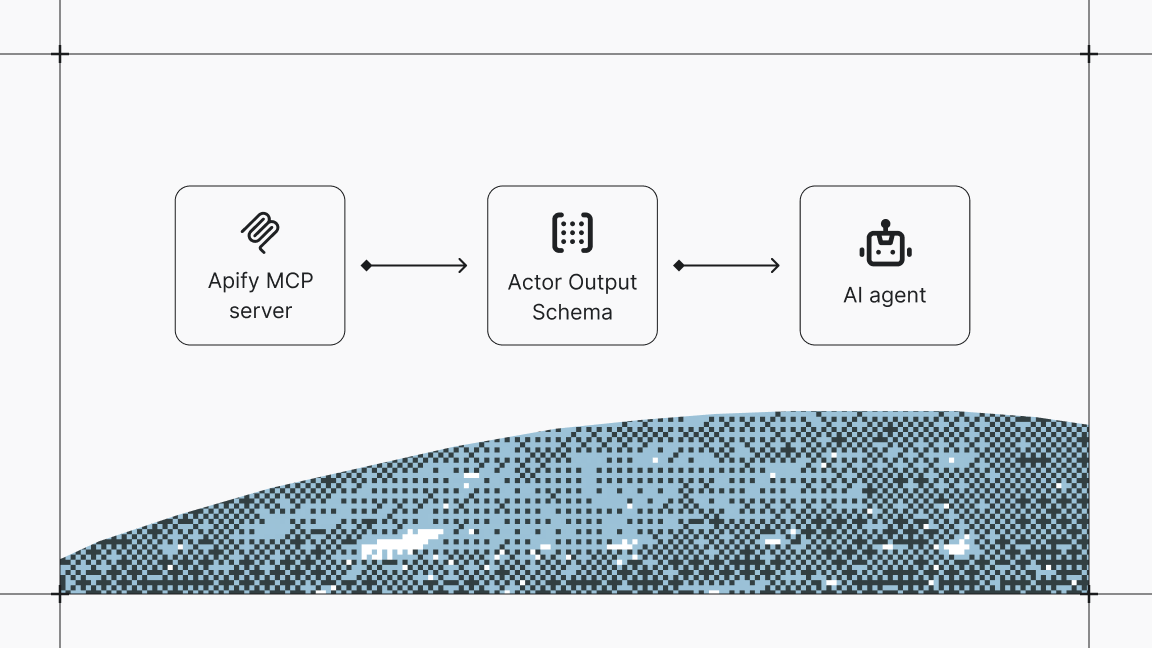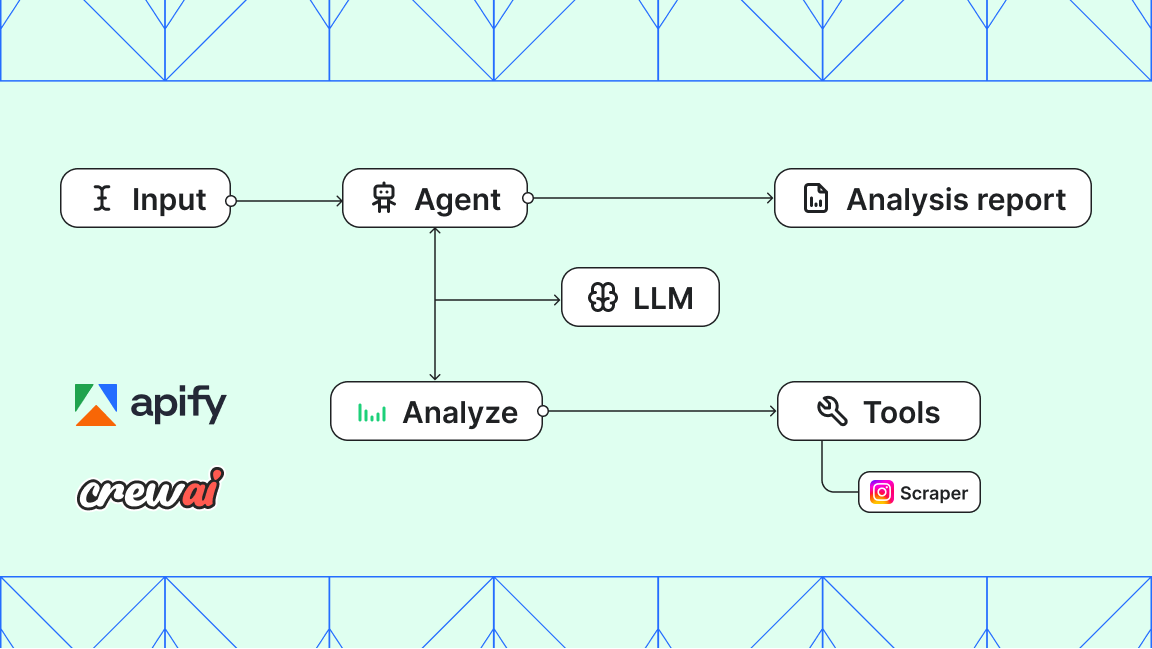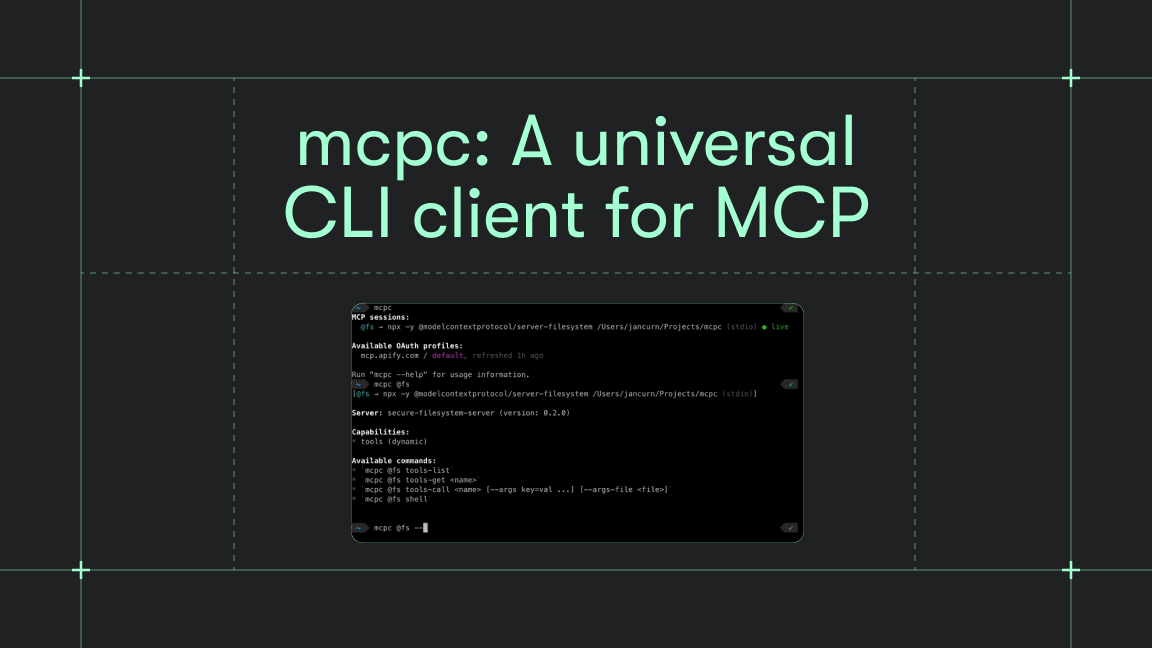AI agents are among the most talked-about applications for large language models. But what are they, and how do they work?
Ethan Mollick describes an agent as “a fuzzily-defined term that refers to an autonomous AI program that is given a goal and then works towards accomplishing it on its own.” Anthropic elaborates: “Agents are systems where large language models (LLMs) dynamically direct their own processes and tool usage, maintaining control over how they accomplish tasks.”
At Apify, we've adopted a modular, developer-focused definition designed for practical implementation. Before examining this approach, it’s important to understand what differentiates AI agents from other AI tools, their defining traits, and their real-world applications.
What is an AI agent?
AI agents are goal-oriented systems capable of making independent decisions. They evaluate tasks, choose tools or methods, and adapt their strategy dynamically. For example, an AI agent might analyze different data sources for relevance and switch between APIs based on real-time feedback.
So, what's the difference between AI-powered tools and AI agents?
AI tools and agents both use artificial intelligence but serve different purposes. As mentioned before, AI agents are capable of making independent decisions. In contrast, tools typically handle single, predefined tasks without autonomy. For example, an AI-powered sentiment analysis tool might classify text as positive or negative but cannot decide what text to analyze or adapt its method based on context.
Key characteristics of AI agents
1. Autonomy and decision-making
AI agents require minimal human input. Their ability to analyze conditions, evaluate options, and make decisions to achieve their objectives enables them to handle complex or changing environments more effectively than AI tools.
2. Goal-oriented behavior
AI agents pursue specific goals, such as collecting data, optimizing processes, or generating insights. Unlike reactive systems like chatbots, they work iteratively toward these objectives, often coordinating multiple tasks to achieve them.
3. Perception and action
Agents must perceive their environment through data inputs - via APIs, user interactions, or other sources - and act based on this information. Actions range from sending commands and generating reports to invoking external tools or systems.
4. Learning and adaptation
Many AI agents use fine-tuned LLMs to refine and improve their reasoning over time. This self-improvement capability makes them increasingly effective at solving problems, even when conditions evolve.
The Apify approach to AI agents
At Apify, we extend these principles with a modular framework that emphasizes practicality for developers.
AI agents on the Apify platform are Actors that demonstrate autonomy in achieving specific goals. They utilize LLMs and potentially other Actors or external systems to reason about a task, plan it, and execute it effectively.
What are Actors?
Actors are machine workers in the cloud that automate tasks like filling out web forms, crawling entire websites, and hosting AI agents to perform complex operations. They're the building blocks of the Apify ecosystem. Key features of Actors include:
- Well-defined input/output: Actors exchange data using JSON-based inputs and outputs.
- Isolated environments: Each Actor runs as a docker container in an isolated, scalable instance.
- Memory: Built-in storage systems, like datasets, files, logs, and configuration.
- Versatile collaboration: Actors can communicate and collaborate, share data, call each other, and react to events, allowing modular workflows in multi-agent systems.
When AI reasoning is added, Actors evolve into AI agents capable of autonomy, dynamic decision-making, and complex problem-solving. For instance, an AI agent on Apify might call multiple data-scraping Actors, process the results, and determine the next steps based on intermediate findings.

The flexibility of Apify Actors allows developers to build single-purpose agents or interconnected systems. This versatility supports a range of use cases, including:
- Workflow automation: Combining pre-defined paths with adaptive decision-making.
- Multi-agent collaboration: Agents working together to tackle larger, more complex challenges.
A key advantage of this approach is scalability. Any functionality that can be “Actorized” becomes part of a broader ecosystem for application in fields like market research, process optimization, and predictive analytics.
Learn more about Actors in The web Actor programming model whitepaper
How Apify provides integration capabilities
Apify’s platform is inherently designed for integration. AI agents built with Apify benefit from:
- A modular architecture: Actors can be configured to call APIs, process data, and trigger other tools.
- Pre-built templates and libraries: Apify provides ready-made solutions for integrations with platforms like Pinecone, HuggingFace, LangChain, LlamaIndex, and Amazon Bedrock.
- Cloud-native design: Actors run in containerized environments, making it easy to scale integrations while maintaining reliability.
This emphasis on integration ensures that AI agents are not only autonomous but also effective in complex, multi-system environments.
The ultimate goal is to create a thriving ecosystem and marketplace where AI agents are not just tools but integral parts of innovative solutions.
-- Jiri Spilka, Senior Engineer at Apify
A marketplace for AI agents
Apify Store has already proven itself as a valuable marketplace for developers to share and monetize their web automation solutions. With the rise of AI agents, Store’s role has expanded for creators to distribute and monetize agent-driven systems.
Creators building AI agents on Apify benefit from:
- Modular integration: Apify Store’s 4,000+ pre-built Actors for web data collection and automation can connect to agents, so developers can build modular, scalable solutions.
- Hosting infrastructure: Apify provides compute, storage, and developer tools (SDK, API), eliminating the need for external cloud services or setting up your own server.
- Built-in monetization: A billing system is integrated into the platform that makes it easy for creators to monetize their AI solutions.
- Targeted marketing: Apify can promote high-performing agents through its channels to help creators reach relevant users.
- Community access: Developers can participate in knowledge-sharing, contribute to discussions on Discord, and exchange ideas with other creators.
By positioning Apify Store as the go-to marketplace for AI agent creators, we’re giving developers the opportunity to monetize their expertise and businesses access to cutting-edge agent solutions without starting from scratch.
The future of agentic systems
The tools to advance agentic systems are here, and their potential is vast. By combining autonomy, modularity, and adaptability, developers can create transformative solutions that go beyond the capabilities of AI-powered tools.
With the modularity of Actors, creators can produce scalable, adaptable systems for tasks like data collection, workflow automation, and predictive modeling.
More about AI agents
- How to build an AI agent - A complete step-by-step guide to creating, publishing, and monetizing AI agents on the Apify platform.
- AI agent workflow - building an agent to query Apify datasets - Learn how to extract insights from datasets using simple natural language queries without deep SQL knowledge or external data exports.
- AI agent orchestration with OpenAI Agents SDK - Learn to build an effective multiagent system with AI agent orchestration.
- 5 open-source AI agents on Apify that save you time - These AI agents are practical tools you can test and use today, or build on if you're creating your own automation.
- 11 AI agent use cases (on Apify) - 10 practical applications for AI agents, plus one meta-use case that hints at the future of agentic systems.
- The state of MCP - The latest developments in Model Context Protocol and solutions to key industry challenges.
- How to use MCP with Apify Actors - Learn how to expose over 5,000 Apify Actors to AI agents like Claude and LangGraph, and configure MCP clients and servers.
- 10 best AI agent frameworks - 5 paid platforms and 5 open-source options for building AI agents.
- Best low-code and no-code AI agent builders in 2025 - If frameworks like LangGraph or Haystack are too challenging for you, these AI agent builders might be what you're looking for.
- AI agent architecture in 1,000 words - A comprehensive overview of AI agents' core components and architectural types.
- 7 real-world AI agent examples in 2025 you need to know - From goal-based assistants to learning-driven systems, these agents are powering everything from self-driving cars to advanced web automation.
- LLM agents: all you need to know in 2025 - LLM agents are changing how we approach AI by enabling interaction with external sources and reasoning through complex tasks.
- 7 types of AI agents you should know about - What defines an AI agent? We go through the agent spectrum, from simple reflexive systems to adaptive multi-agent networks.








